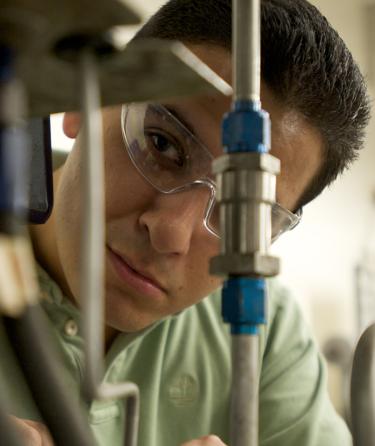General Engineering
About Our Classes
The Engineering courses at West Los Angeles College offers lower-division engineering, pre-engineering, and technology courses that allows students to complete their transfer requirements, obtain a certificate and/or associates degree. Here is the list of Engineering program student outcome.
- Design/conduct experiments, analyze and interpret data
- Design a system, component, or process to meet desired needs within realistic constraints such as economic, environmental, social, political, ethical, health and safety, manufacturing, and sustainability
- Function on multi-disciplinary teams
- Identify, formulate, and solve engineering problems
- Understand the professional and ethical responsibility
- Communicate effectively
- Understand the impact of engineering solutions in a global, economic, environmental and societal context
- Recognize the need for an ability to engage in life-long learning
- Understand contemporary issues
- Use the techniques, skills, and modern engineering tools necessary for engineering practice
Electrical Engineering
This course introduces the major engineering disciplines, engineering decision-making and ethics, and factors for success in academic and professional settings. It provides general knowledge of engineering design, communications, problem solving, fundamental physical concepts, and computational engineering tools. Presents the relationship of engineering to materials, the environment, and mathematics. Speakers, field trips and classroom activities expose students to the many ways engineering affects our lives and the variety of roles of engineers in society.
Prerequisite: MATH 263 - Calculus III and PHYSICS 038. Co-requisites: Math 275
This course covers electric circuit analysis in time and frequency domains, transient, and steady state solutions. Topics include linear circuit analysis techniques, Kirchhoff's Laws, Network Theorems, mesh and nodal analysis, OP amps and amplifiers, Thevenin/Norton equivalents circuits, natural-forced-complete response of RLC circuits, AC circuits, phasors, three phase power, and frequency response and resonance. The laboratory includes experimental verification of the laws of AC and DC circuits, Kirchhoff's laws, and Thevenin's theorem using instruments such as multimeter, oscilloscopes, and signal generators.
Prerequisite: MATH 263 - Calculus III and PHYSICS 038. Co-requisites: Math 275
This course is an introduction to digital circuit analysis. Topics covered include the following: Number systems, computer arithmetic, and binary codes; binary logic, Boolean algebra, and logic gates; combinational circuits, analysis and design, including adders, MUX's, decodes, etc.; and sequential circuits analysis and design. In the lab students design, implement, and debug a combinational circuit; and perform implementation of combinational circuits using logic gates and programmable logic devices and design sequential logic circuits using gates, ROMs, and PALs. Students in the laboratory use FPGA board to program and experience the behavior of circuits.
In this course, students gain new skills in programming and electronics engineering. Arduino is a groundbreaking, open-source electronics prototyping platform based on flexible, easy-to-use hardware and software. The Arduino board can read sensors, control motors and lights, and upload your hand-built code that interacts with the real world. Students learn the Arduino programming language, which is based on C/C++.
Robotics
Robots are used in the auto, medical, and manufacturing industries, in all manner of exploration vehicles, and, of course, in many science fiction films. West Los Angeles College’s Certificate of Achievement in Essential of Robotics and Programming is open to all majors and to non- degree students. The program is designed to instruct students on the design, construction and programming of robotic and automated systems. Obtaining a certificate in Essential of Robotics and programming prepares students for work in robotics and exposes them to several facets of the field. The program allows for a focus on the hardware and modeling or the algorithms, all of which are the integral components of robotics.
This is an introductory course in robotics; with hands-on experience on building a PARALLAX robot. Students learn about electric motors, servos, sensors, switches, and actuators. Students learn Basic Stamp computer programming and integration into a working robotic unit; including mechanical assembly, connecting electronic components, wiring and soldering, and testing. This course does not require any prerequisite or any prior knowledge in Programming.
